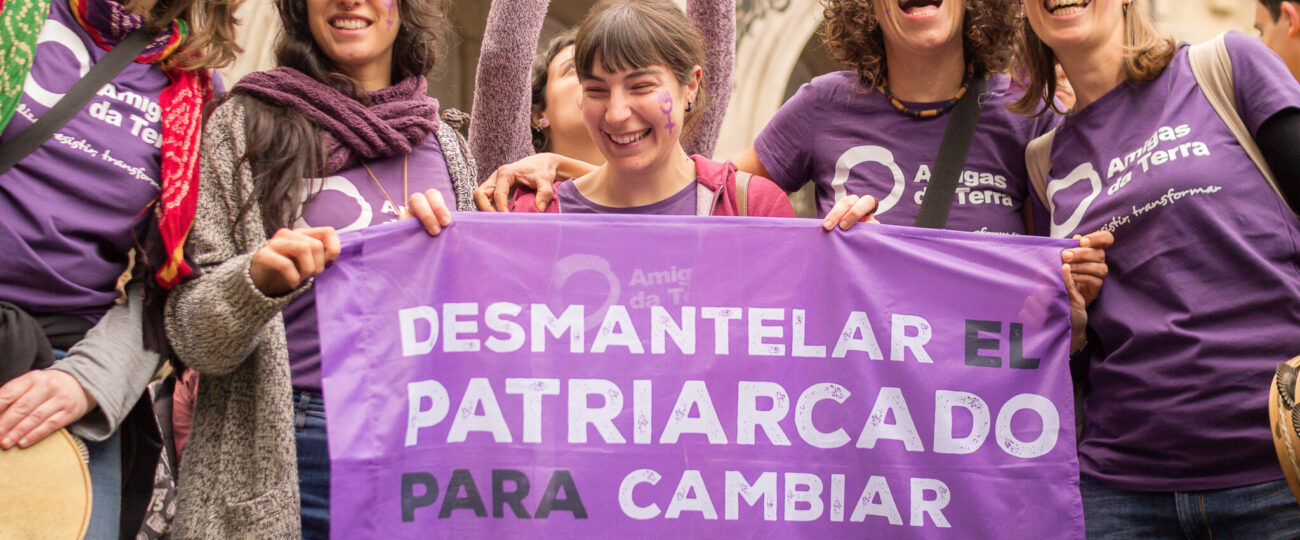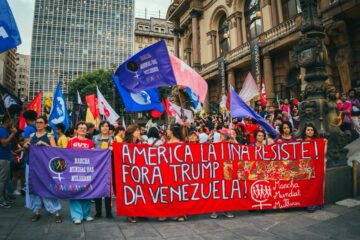The debates presented below were part of a training cycle on feminist economy and environmental justice. Organized by the World March of Women (WMW) in Brazil, in collaboration with Friends of the Earth International’s (FOEI) gender justice and dismantling patriarchy working group, the training was aimed at members of the federation from all regions of the world.
Capire and Real World Radio are publishing summaries of the discussions that took place during this process as a way to record the collective learnings and share these ideas with a broader audience, strengthening alliances. In the previous text, published in June 2025, we reported on the reflections from the first and second modules of the training cycle, in which the concept of feminist economy was introduced and groups were able to share experiences, practices, and challenges.
The meetings reinforced key ideas of feminist economy, which is not understood merely as a theoretical framework but as a tool for anti-systemic struggle, put into practice collectively through alliance-building processes. Unlike the previous session, which featured presentations by WMW activists Tica Moreno and Sophie Ogutu, the final session followed a more participatory format, aiming to develop ways to further integrate feminist economy into Friends of the Earth International’s agenda.
Introducing Feminist Economy Debates
Reviewing the topics covered, WMW activist Natália Lobo explained: “We discussed some of the critiques that feminist economy makes of classical capitalist economy. For us, when we talk about feminist economy, we are talking about an economy that breaks with the capitalist system — one that not only seeks to reorganize production differently within the economic system, but that also considers the role of social reproduction in this system.”
Natália shared the transformative proposals of feminist economy:
“We propose that reproduction must take on a new level of importance in how we think about the economy, because the truth is that the center of the economy lies in the work that sustains life.” She concluded: “Therefore, the contribution of feminist economy is to assert that sustaining life — not the profits of transnational corporations and a handful of billionaires, as is the case today — should be at the center of the economic system.”
Topics such as interdependence and ecodependence were also addressed as essential links with the struggle for environmental justice and for a harmonious relationship with nature — one that can only exist without capital’s attacks on territories. “We are nature and we depend on nature. Therefore, the economic system should not treat nature as an external factor,” Natália affirmed.
Feminist Economy for Environmental Justice
The final session’s work drew on the agendas of Friends of the Earth’s four programs: Climate Justice and Energy; Economic Justice and Resisting Neoliberalism; Food Sovereignty; and Forests and Biodiversity. From there, participants debated possible intersections between feminist economy and these programs.
Participant Mariana Porras, for example, connected the principles of feminist economy to the context of her country, Costa Rica, “where public institutional structures are being dismantled in the name of commodifying and privatizing common goods.” For her, feminist economy must be a tool for struggle: “It’s not just about mentioning it as a principle, but about ensuring that people understand and adopt it. This work requires a great deal of exchange, organizing, and effective communication tools.”
Ana María Vázquez, from El Salvador, shared reflections on how feminist economy is already part of Friends of the Earth’s work: “Our work as activists and as active participants in the groups we organize is also part of feminist economy.” According to her, “It is essential to focus on recognizing care as work and sustaining it” — including the care carried out within political organizations themselves.
Natalia Salvático, from Argentina, also affirmed the presence of feminist economy in the federation: “To me, the work we do is completely aligned with the principles of feminist economy, in the sense of the capital-versus-life conflict — which is nothing more than capitalism’s attack on the environment, on ecodependence, and on interdependence. Putting the sustainability of life at the center is also what we defend in the environmental movement, while remaining vigilant to the ways institutions are captured by transnational corporations as we build our alliances.” One of the ongoing debates is on feminist just transition, which calls for a profound reorganization of the energy model.
“I believe feminist economy allows us to go beyond the boundaries of our own struggle,” said Natalia Carrau, from FoEI’s gender justice and dismantling patriarchy working group. “Debating the economy from a feminist perspective not only makes visible the people responsible for keeping the economy running for life rather than for profit, but also enables us to build bridges with other struggles that are not directly our own, yet are part of the struggles of other peoples, countries, or sectors of society.” she said, positioning feminist economy as a tool for alliance-building.
The debates also touched on communication, reflecting on strategies to expand the reach of feminist economy and its critique of the capital-versus-life conflict. “Feminist economy gives us a better understanding, a better language to link dismantling the patriarchy and dismantling also the colonialism and capitalism,” proposed Ghislaine Fandel, from Friends of the Earth International.Participants reflected on how the proposal for a radical transformation of work and of the organization of life is particularly relevant in times of growing hopelessness: “ It’s sometimes almost scary to see how, for some people, it can be easier to imagine a world where we have environmental devastation and climate collapse and ongoing human rights violations than a world without capitalism and with these alternative economies.”




